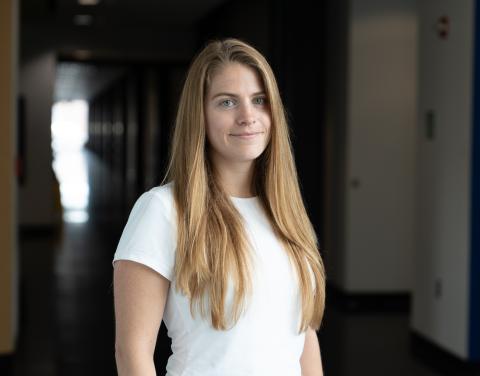
Chelsea Kimball is an Ocean Engineering Ph.D. student specializing in wave energy. Her hometown is Auburn, NH and she received a bachelor's in Mechanical Engineering here at UNH.
1. Why did you choose UNH for your graduate program?
When applying for graduate school, I knew that Professors Rob Swift and Martin Wosnik were making advances in wave and renewable energy research, and I wanted to be a part of that work. I was inspired by the progress the UNH teams have made in wave energy research and aquaculture, because of the engineering challenges involved and the potential, significant, positive impacts to our energy system.
2. What is your Research Focus?
My research focuses on wave-powered upwelling devices, which could be used in kelp aquaculture to increase productivity. Increased productivity of kelp could make it a viable and sustainable option for biofuel. Upwelling increases kelp growth in the ocean by bringing cold, nutrient-rich water from the bottom to the surface. Wave power is a renewable energy source, and is available where kelp is farmed, making it a good choice for powering the upwelling devices. Through numerical modeling, field deployments, and laboratory experiments, the goal is to show what benefit these devices can bring to kelp aquaculture.
3. What are you hoping to accomplish with this research? How will it potentially impact society or day-to-day life?
By defining the benefit of wave-powered upwellers in kelp aquaculture and iterating the design to make it usable in industry, I hope to design a device that can aid the kelp mariculture industry to produce more kelp. Kelp as a feedstock material typically produces less atmospheric carbon compared to other currently used materials. And the potential uses for kelp are wide-ranging including in biofuel, animal feed, textiles, and building materials. This research has the potential to change many aspects of our society to become more sustainable and carbon neutral.
4. What do you enjoy most about your experience at UNH?
The people at UNH have been supportive and encouraging throughout my time here. I took a few years between my undergraduate and graduate degrees working in industry, and when I returned to UNH several people made sure to welcome me back. The research resources available at UNH have made my academic achievements possible, from the crew of the R/V Gulf Challenger deploying the wave pump in the ocean to the personnel teaching me how to use the UNH High Performance Computing cluster. I am very grateful for the willingness of this community to help me along the way.
5. What do you hope to do after your time at UNH?
I hope to continue wave energy research in some way, whether that is in industry, at a national laboratory, or somewhere else. Knowing the untapped potential of our coastal wave resource indicates that there is room for change in our energy system. I would love to be a part of that shift for a more sustainable energy future and safer climate. I hope to contribute to wave energy device design, prototyping, and testing because it is so satisfying to work towards solving these engineering challenges and incrementally build towards a working device.
6. What is your advice for someone on how to best prepare for a graduate program?
Spend some time thinking about what makes you excited to get out of bed every day. If you have a clear answer, make sure that is somehow incorporated into your graduate program. Prepare your mind by being open to new ideas, new ways of thinking, and to being wrong. Sometimes the best way to learn is to make mistakes. One other piece of advice for potential graduate students: keep going. Making gradual progress through showing up every day and doing your best will serve you well in a graduate program.